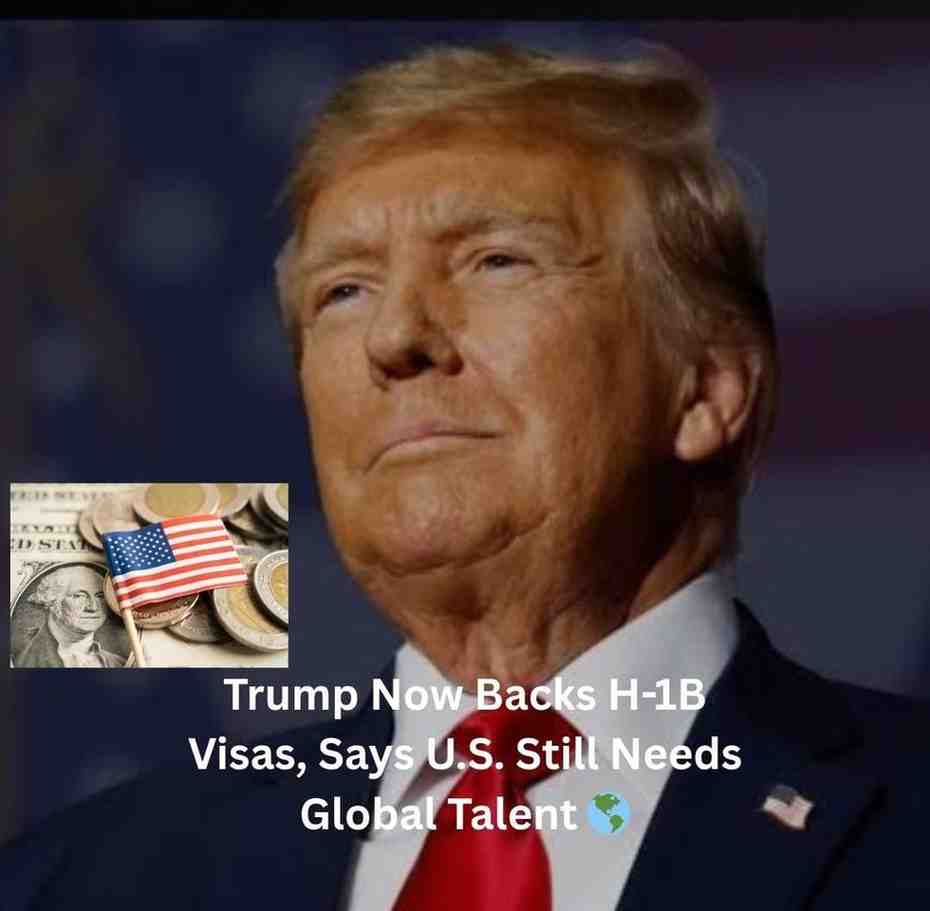Donald Trump’s Surprising New Stand on Immigration: From Tough Talk to Talent Appreciation — Former President Backs H-1B Visas and International Students, Says “You Can’t Manufacture Talent”

In what many are calling a remarkable turnaround, former U.S. President Donald Trump has struck a notably softer and more appreciative tone toward skilled immigration, signaling support for H-1B visa holders and international students — groups that his earlier policies often restricted. Speaking in a recent interview on Fox News, Trump highlighted the importance of attracting and retaining global talent to preserve America’s leadership in innovation, technology, and research.
This shift represents a stark contrast to his previous administration’s firm stance on tightening borders and reducing foreign work visas. Trump now appears to acknowledge a fundamental reality: America’s success as a global superpower is deeply linked to its ability to attract skilled professionals from around the world.
“You Can’t Manufacture Talent”: Trump’s New Acknowledgment
During the interview, Trump emphasized that while he continues to advocate for American jobs, the United States cannot thrive in isolation. He candidly remarked,
“You also do have to bring in talent. You don’t have certain talents, and people have to learn. You can’t take people off, like an unemployment line, and say, ‘I’m going to put you into a factory. We’re going to make missiles.’”
His statement reflects a broader understanding that advanced industries — especially in fields such as defense technology, artificial intelligence, engineering, and biotech — rely heavily on specialized expertise. Many of these crucial skills are honed by professionals trained abroad, particularly those on H-1B visas, a category that enables highly skilled foreign nationals to work in specialized U.S. sectors.
Analysts note that Trump’s words underscore the fine line between protecting domestic jobs and ensuring access to global expertise. Economists and corporate leaders have long argued that the innovation ecosystem in the United States depends on collaboration between local and foreign professionals.
Warmer Words for International Students
Perhaps even more surprising is Trump’s newly positive rhetoric toward foreign students — a segment that was hit hard by visa restrictions and pandemic-era policies during his first term. Trump praised the role of international students in shaping America’s intellectual and economic landscape.
According to Times Now, Trump acknowledged that foreign students make significant contributions to American universities, research institutions, and tech startups. He said their presence boosts not only the nation’s academic excellence but also its long-term competitiveness.
This represents a key tonal shift. Between 2017 and 2020, international students faced challenges such as stricter visa renewals, reduced post-study work opportunities, and fears of deportation. Trump’s latest comments suggest that his administration — or potential future leadership — may reconsider these barriers in favor of a more balanced approach that both protects American interests and welcomes global talent.
America’s Relationship with Global Talent
For decades, the United States has drawn the best minds from across the globe — scientists, coders, engineers, doctors, and innovators — who have contributed enormously to the country’s progress. From the early days of Silicon Valley to breakthroughs in biotechnology and space research, foreign professionals have been at the forefront of America’s technological revolution.
The H-1B visa program, often debated in political circles, has become a crucial bridge for connecting U.S. companies with specialized global expertise. Tech giants such as Google, Microsoft, and Apple have repeatedly advocated for expanding this program, warning that overregulation could push innovation hubs abroad.
Trump’s recent acknowledgment of these realities hints that he now recognizes the strategic necessity of foreign workers and students in sustaining America’s economic edge. Industry experts say that this rhetoric could mark the beginning of a policy recalibration, one that strengthens domestic employment while still leveraging international talent.
What Analysts Are Saying
Policy experts believe Trump’s remarks could pave the way for a revised immigration framework — potentially one that focuses more on merit-based entry rather than blanket restrictions. This could mean broader pathways for individuals who excel in STEM (Science, Technology, Engineering, and Mathematics) fields or contribute significantly to U.S. innovation.
“Trump’s comments reflect a pragmatic understanding of global competition,” said Dr. Michael Reynolds, a U.S. policy analyst. “In today’s world, countries that welcome talent — not repel it — will lead in technology, defense, and economic growth. America simply cannot afford to lose that advantage.”
Some even speculate that Trump’s changing tone could be part of a larger election strategy, appealing to business communities, tech leaders, and moderate voters who view skilled immigration as an economic necessity rather than a political liability.
The Road Ahead for H-1B Holders and Students
If Trump’s revised outlook translates into actual policy, international students and foreign professionals could soon experience a more welcoming environment. This may include streamlined visa approvals, clearer pathways to permanent residency for top talent, and a renewed emphasis on research collaborations.
For international students already in the U.S., this could also mean greater job security and career opportunities post-graduation — especially in high-demand fields such as artificial intelligence, cybersecurity, renewable energy, and advanced manufacturing.
In contrast to earlier years, when uncertainty clouded the future of thousands of talented immigrants, this new approach could restore confidence in America as the world’s premier destination for learning, innovation, and entrepreneurship.
America’s Strength Lies in Global Collaboration
Trump’s evolving stance highlights an undeniable truth in the 21st century — no nation can innovate in isolation. In a world where technology evolves faster than ever, collaboration between diverse minds is not just an advantage; it’s essential.
By recognizing that “you can’t manufacture talent,” Trump has, perhaps unintentionally, rekindled a conversation about what truly makes America great — its openness to ideas, ambition, and excellence, regardless of where they come from.